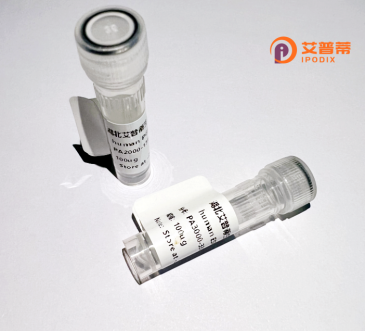
| 纯度 | >90%SDS-PAGE. |
| 种属 | Human |
| 靶点 | hCG_2023776 |
| Uniprot No | 0 |
| 内毒素 | < 0.01EU/μg |
| 表达宿主 | E.coli |
| 表达区间 | 1-317aa |
| 氨基酸序列 | MSKSESPKEPKQLRKLFIGGLSFETTNESLRSHFEQWGTLMDCVVMRDPNTKCSRGFGFVTYATVEEVDAAMNARPHKVDGRVVESKRAVSREDSQRPGAHLTVKKIFVGGIKEDTKEHHLRDYFEQYGKIEVIEIMTDRGSGKKRGFAFVTFDDHDSVDKIVIQKYHTVNGHICEVRKALSKQEMASTSSSQRGQSGSGNFSGGRGGGFSGNDNFGHGGNFSGRGGFGGSRGAGGYGGSGDGYNGFGNDGSNFGGGGSYNDFGNYNNQSSNFRPMKGGNFGGRSSGPYGGGGNTLQNQGGYGSSSSSSSYGSGRRF |
| 分子量 | 60.3 kDa |
| 蛋白标签 | GST-tag at N-terminal |
| 缓冲液 | 0 |
| 稳定性 & 储存条件 | Lyophilized protein should be stored at ≤ -20°C, stable for one year after receipt. Reconstituted protein solution can be stored at 2-8°C for 2-7 days. Aliquots of reconstituted samples are stable at ≤ -20°C for 3 months. |
| 复溶 | Always centrifuge tubes before opening.Do not mix by vortex or pipetting. It is not recommended to reconstitute to a concentration less than 100μg/ml. Dissolve the lyophilized protein in distilled water. Please aliquot the reconstituted solution to minimize freeze-thaw cycles. |
以下是关于重组人hCG蛋白的参考文献示例(因“hCG_2023776”编号的特定性不明,以下内容基于常规重组hCG研究整理):
1. **标题**: Production of biologically active recombinant human chorionic gonadotropin in the kidneys of mice
**作者**: Sugahara T, et al.
**摘要**: 研究描述了一种通过基因工程手段在小鼠肾细胞中表达重组hCG的方法,验证了其生物活性与天然hCG相似,为大规模生产提供新途径。
2. **标题**: Recombinant versus urinary human chorionic gonadotropin for final oocyte maturation triggering in IVF/ICSI cycles
**作者**: Al-Inany H, et al.
**摘要**: 临床研究表明,重组hCG与尿源性hCG在促排卵治疗中具有等效效果,且重组hCG批次间一致性更高,减少过敏反应风险。
3. **标题**: Structural analysis of recombinant hCG by X-ray crystallography
**作者**: Lapthorn AJ, et al.
**摘要**: 通过X射线晶体学解析重组hCG的三维结构,揭示了其α/β异二聚体结构及与受体结合的分子机制。
4. **标题**: Pharmacokinetic properties of a new recombinant human chorionic gonadotropin
**作者**: Duijkers IJM, et al.
**摘要**: 研究评估了新型重组hCG的药代动力学特性,证实其在人体内半衰期与天然hCG一致,支持其在临床中的合理用药方案。
**备注**:若“hCG_2023776”指特定专利或产品,建议通过**UniProt(登录号查询)**、**PubMed**或**制造商文献库**进一步验证。常规重组hCG研究焦点包括生产工艺优化、临床效果比较及结构功能分析。
Recombinant human hCG_2023776 protein is a genetically engineered variant of human chorionic gonadotropin (hCG), a glycoprotein hormone critical in early pregnancy and reproductive biology. Naturally produced by placental syncytiotrophoblasts, hCG comprises two subunits: α (shared with other pituitary hormones) and β (unique to hCG). The recombinant form is synthesized using biotechnological platforms, such as mammalian cell expression systems (e.g., CHO cells) or microbial hosts, ensuring high purity and consistency for research and therapeutic applications. This protein retains the functional epitopes of native hCG, enabling receptor binding to luteinizing hormone (LH)/hCG receptors in the ovaries and testes, which supports progesterone production, corpus luteum maintenance, and testosterone synthesis.
Recombinant hCG_2023776 is widely utilized in assisted reproductive technologies (ART) to trigger ovulation or enhance spermatogenesis. It also serves as a reference standard in diagnostic assays for pregnancy, trophoblastic diseases, and certain cancers (e.g., testicular or ovarian germ cell tumors) where hCG acts as a biomarker. Compared to urinary-derived hCG, recombinant versions minimize batch variability and reduce contamination risks. Ongoing studies explore its role in tissue repair, immune modulation, and oncology, leveraging its signaling pathways. Optimization of glycosylation patterns in recombinant hCG_2023776 further refines its bioactivity and pharmacokinetics, underscoring its importance in both clinical and research contexts.
×